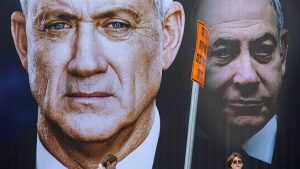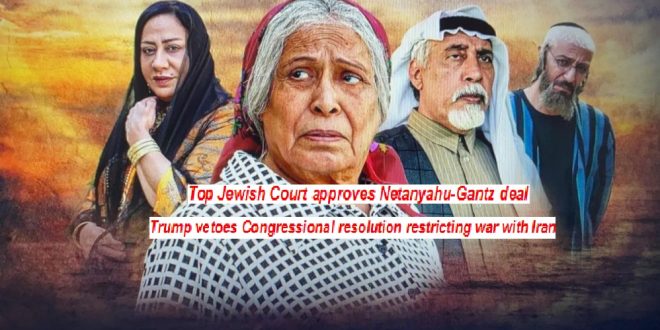07-05-2020
By SJA Jafri + Agencies
RIYADH/ JERUSALEM/ WASHINGTON/ TEHRAN: Two Saudi television series airing during the holy month of Ramadan have caused an uproar in the Arab world as critics accuse the network of trying to change attitudes of animosity towards Israel.
The Dubai-based MBC network has also received criticism for trying to cast the Palestinians in a negative light on the programmes, critics say.
MBC, a media and entertainment arm of the Saudi government, was accused of promoting Israel despite its decades-long occupation of Palestinian and Arab territories, as well as its systematic abuse of Palestinians still under its military control.
Facing a storm of criticism across the Arab world, the Saudi press agency carried a statement by the Saudi government during a cabinet meeting, chaired by King Salman bin Abdul Aziz on Wednesday, reiterating its “full support for the Palestinian people and the Palestinian cause”.
“The Palestinian issue was and is still the Arab and Muslims central issue and the first priority for the kingdom since its inception as it rejected any measure or type of occupation of the Palestinian territories and stood steadfast by the side of the Palestinian people,” the statement said.
In one of the episodes of the Um-Haroun series, which chronicles the life of an elderly Jewish nurse, warm relations between Arabs and Jews are depicted.
A comedy called Exit 7 shows actors discussing why Saudis should normalise ties with Israel. Its two main actors engaged in a conversation about the Arab-Israeli wars and the “thankless” Palestinians who are “unworthy” of assistance because some have criticised Saudi Arabia.
Although Saudi Arabia has financially backed Arab countries that fought against Israel, it did not itself engage in any military confrontation with Israel since the first Arab-Israeli war in 1948.
MBC has denied it was attempting to change Arab attitudes towards Israel and has refused critics’ calls to cancel the shows.
“MBC is bringing joy and happiness in the hearts of people who are living the despair of the Arab world since the start of the Arab-Israeli conflict,” a spokesman said.
‘Foster antipathy’
Joshua Cooper, from the group Jewish Voice for Peace, said the Saudi TV productions could be a result of the “cosy business and political relationship” between Saudi Arabia and Israel.
“It’s decidedly in both Israel and the Saudi regime’s interest to foster antipathy toward the Palestinians … and simultaneously blur the distinction between Jews and Zionists,” Cooper told Al Jazeera.
He added “Zionist agitators” on Western social media have used the uproar over the television shows to “predictably blame Arabs for the Israeli violence against them and conflate Jews with Israel”.
The founding of Israel in 1948 and subsequent massacre and expulsion of Palestinians from their lands in Palestine in the 1940s and ’50s inflamed passions throughout the Middle East.
Washington-based Palestinian-American journalist Mohamad Dalbah said Saudi Arabia has never “truly” had any serious issue with Israel, and over the decades collaborated with it on several occasions.
“What stood in the way of an open and public ties between Saudi Arabia and Israel was the Saudi desire to have it through an Arab umbrella cover,” he said.
As evidence of his argument, Dalbah said Saudi Arabia proposed two peace initiatives with Israel, in 1982 and in 2002, in order to end the Arab-Israeli conflict and establish official relations with Israel.
The Saudi proposals envisioned full and normal ties between Israel and the Arab and Muslim world, in exchange for an end to the conflict and the establishment of an independent Palestinian state. Israel rejected both proposals.
 Prime Minister Benjamin Netanyahu’s indictment on corruption charges does not disqualify him from forming a government, Israel’s top court has said, paving the way for the veteran leader to remain in power.
Prime Minister Benjamin Netanyahu’s indictment on corruption charges does not disqualify him from forming a government, Israel’s top court has said, paving the way for the veteran leader to remain in power.
In its ruling against opposition petitioners on Wednesday, the Supreme Court also found that Netanyahu’s unity government deal with his election rival Benny Gantz does not violate the law, dismissing arguments that it unlawfully shields him in a corruption trial.
A group of non-profit advocacy organisations had challenged the legality of the deal.
“We did not find any legal reason to prevent Netanyahu from forming a government,” the court said.
In a hearing this week, the Supreme Court heard arguments from eight petitioners seeking to block the deal, including former Gantz ally Yair Lapid, head of the Yesh Atid party.
Netanyahu and Gantz declared that they hope to swear in the new government on May 13.
The alliance formed last month between the right-wing incumbent and his centrist challenger followed three inconclusive elections in less than a year.
Under the three-year deal, Netanyahu will serve as prime minister for 18 months, with Gantz as his alternate, a new position in Israeli governance.
They will swap roles midway through the deal, with cabinet positions split between Netanyahu’s Likud party and Gantz’s Blue and White alliance, as well as their respective allies.
Legislators began voting on various bills on Wednesday to enact the coalition deal, with individual votes scheduled on each of the roughly 1,000 amendments proposed by the deal’s opponents. A definitive outcome is not expected until Thursday.
The coalition appears to have the 61 votes needed in the 120-seat parliament for approval.
The deal could offer Israel rare political stability as it seeks to repair the economic damage wrought by the novel coronavirus, which has infected more than 16,000 people in the country.
 United States President Donald Trump on Wednesday vetoed legislation passed by both houses of Congress seeking to limit a president’s ability to wage war against Iran.
United States President Donald Trump on Wednesday vetoed legislation passed by both houses of Congress seeking to limit a president’s ability to wage war against Iran.
“This was a very insulting resolution, introduced by Democrats as part of a strategy to win an election on November 3 by dividing the Republican Party,” Trump said in a statement released by the White House. “The few Republicans who voted for it played right into their hands,” he said.
The US Senate, where Trump’s fellow Republicans hold a 53- to 47-seat majority, is expected to hold a veto override vote as soon as Thursday.
The resolution, which passed the House of Representatives in March and the Senate in February, was the latest effort by Congress to wrest back from the White House its constitutionally guaranteed authority to declare war.
A handful of Republicans in both houses supported the measure when it passed, but not enough to muster the two-thirds majority necessary in both houses to override a veto.
The US House of Representatives passed the resolution in an attempt to stop Trump from further military action against Iran, rebuking the president after he ordered a January 3 drone strike that killed top Iranian commander General Qassem Soleimani, bringing the two nations to the brink of war.
The Democratic-controlled House voted 227-186, mostly along party lines, sending the war powers resolution to the Senate. The partisan vote reflected the deep divide in Congress over Trump’s Iran policy and how much of a say lawmakers should have over the use of the military.
Democrats accused Trump of acting recklessly and backed the resolution, while Trump’s fellow Republicans, who rarely vote against the president, opposed it.
Republicans said Democrats endangered the country by trying to pass a resolution they characterised as an empty political gesture, at the start of a US general election year.
The War Powers Act, which was passed in 1973 as Congress reacted to secret bombings during the bitterly divisive Vietnam War, says the House and Senate can pass a resolution to force the withdrawal of troops engaged in a foreign conflict without Congress’s consent.
The move marks the seventh time Trump has used his veto pen, including on a previous war powers resolution related to the US military’s assistance to Saudi Arabia in Yemen’s civil war.
 Pressmediaofindia
Pressmediaofindia




